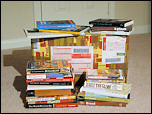The Financial Crisis Inquiry Report is the official report the congressional committee that investigated the causes of the financial crisis in 2007-2010. The report reads surprisingly well, but is disappointing when it comes to analysis and finding root causes. We bought a copy of the book in the bookstore at the IMF on a Sunday afternoon in D.C. and I read it while we lived on 2400 M Street.
On the plus side: the book is well structured. Many of the developments during the crisis require an understanding of derivatives such as CDOs and mortgage backed securities, and the book does a good job explaining how they work. Unfortunately, the majority report is written as if the authors don’t like financial markets. There is a constant tendency to frame things in a negative light, such as when describing securization, with suspicion. Also, if concepts like derivatives or structured finance are “arcane” to the authors, maybe someone else should have written the report.
Bi-partisan and not digging deep enough
The main beef I have with the report is that it completely fails to bridge the bipartisan gap in Congress and gives a very one-side (Democratic) view of things. The report was written by a 10-member committee; 6 Democrats and 4 Republicans. No consensus was reached, and the 6 Democratic members voted in favor of the main text, the 4 Republicans against.
This matters a great deal, for example when discussing the influence of the government’s home ownership policies and programs such as HUD. It would have been interesting to know if there was a strong correlation between affordable housing programs and the increase of sub-prime mortgages. The main text makes a reasonable case that HUD was not a major factor in the crisis, but as so much of the report it remains anecdotal. Instead of simply saying ‘no’ (the majority) or ‘yes’ (the dissenters), a real discussion based on scientific analysis would have contributed much more to understanding the fundamentals behind the crisis. In general, the report is good in describing what happened, but sorely deficient in digging deeper and trying to answer ‘why’. Obviously, understand the root causes is essential for framing policies that can help prevent the next crisis.
After the introduction, I read the chapters written by the 4 dissenting members first. I liked their treatment of frequently debated topics such as “should we have saved Lehman”. The 4th dissenter, who is associated with the American Enterprise Institute, wrote a standalone chapter where he blamed the government policies on affordable housing. Again – it’s interesting to see these opinions, disappointing that there was no effort to reach an (academic) consensus. In general, the report is superficial and often reads as a partisan attack on “deregulation” and “complex finance”.
Still, it was an enjoyable read, almost like a thriller. The demise of Bear Stearns makes for fascinating reading. When the crisis was unfolding I listened to NPR a lot and often I'd hear the voice of Kai Ryssdal, the presenter of Marketplace in my head while reading the report.
The report made me understand something that I had wondered about before -- the unwillingness of many lenders to lend during the crisis, even when they offered good collateral. The problem for some lenders is that they are not allowed to own certain collateral, so when the counterparty disappears they may end up owning and having to sell the collateral immediately, at fire sale prices. The influence of this also surprised the SEC, as the report explains.
A difficult job for regulators
The chapters about the regulators were quite interesting. First of all, it is silly that financial institutions can shop around for favorable regulators. The regulators had to make difficult choices during the crisis (and before the crisis). What is in the best interest of the country? Never ever allow any risk and thus dramatically reducing innovation and profitability? It explained that moral hazard was a strong motivator for the regulators to letting Lehman fail. Similar trade-offs were made by Congress. The decision to create hybrid public/private companies such as Freddie Mac and Fanny Mae created huge losses to the taxpayer during the crisis (estimates range to $400 billion). However, arguably they also helped to create a better mortgage market in the years before that. Again, would have been quite interesting to read some analysis of the economics and politics of those decisions.
My goals in reading the report were two-fold: learn more details about the crisis, and understand the root causes. The book helps with the first goal, but sadly fails in the second.











